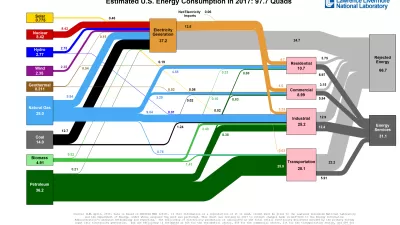Total on-site energy use in U.S. homes declined between 2009 and 2015, thanks to new new building technology and warmer winters.

Elizabeth La Jeunesse reports: "Although the number of U.S. households increased by about 4 percent between 2009 and 2015, total on-site energy usage in occupied U.S. homes declined by more than 10 percent, according to our analyses of survey results recently released by the U.S. Energy Information Administration (EIA)."
"Overall, while total households increased from 113.6 million in 2009 to 118.2 million in 2015, total site energy use by those households dropped by more than a quadrillion Btu, even as consumption increased among non-residential uses. As a result, the residential sector’s share of total U.S. energy consumption dropped from 22.4 percent in 2009 to 21.1 percent in 2015," adds La Jeunesse.
The article digs further into the data from the EIA, finding larger energy reductions in the multi-family housing sector, and breaking down reductions by the age of the building stock. The article also includes information about why and how energy use declined.
FULL STORY: U.S. HOUSEHOLDS ARE USING LESS ENERGY

Study: Maui’s Plan to Convert Vacation Rentals to Long-Term Housing Could Cause Nearly $1 Billion Economic Loss
The plan would reduce visitor accommodation by 25,% resulting in 1,900 jobs lost.

North Texas Transit Leaders Tout Benefits of TOD for Growing Region
At a summit focused on transit-oriented development, policymakers discussed how North Texas’ expanded light rail system can serve as a tool for economic growth.

Why Should We Subsidize Public Transportation?
Many public transit agencies face financial stress due to rising costs, declining fare revenue, and declining subsidies. Transit advocates must provide a strong business case for increasing public transit funding.

How Community Science Connects People, Parks, and Biodiversity
Community science engages people of all backgrounds in documenting local biodiversity, strengthening connections to nature, and contributing to global efforts like the City Nature Challenge to build a more inclusive and resilient future.

Alabama: Trump Terminates Settlements for Black Communities Harmed By Raw Sewage
Trump deemed the landmark civil rights agreement “illegal DEI and environmental justice policy.”

Dear Tesla Driver: “It’s not You, It’s Him.”
Amidst a booming bumper sticker industry, one writer offers solace to those asking, “Does this car make me look fascist?”
Urban Design for Planners 1: Software Tools
This six-course series explores essential urban design concepts using open source software and equips planners with the tools they need to participate fully in the urban design process.
Planning for Universal Design
Learn the tools for implementing Universal Design in planning regulations.
City of Santa Clarita
Ascent Environmental
Institute for Housing and Urban Development Studies (IHS)
City of Grandview
Harvard GSD Executive Education
Toledo-Lucas County Plan Commissions
Salt Lake City
NYU Wagner Graduate School of Public Service





























